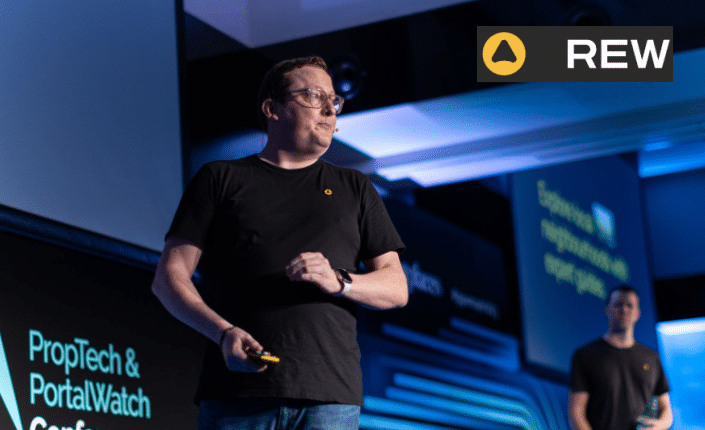
What does Netflix-style realtor branding look like?
Real Estate Works (REW), a property portal operating in the west of Canada, has put that idea to the test with the most innovative branding exercise to hit the portal world since Purplebricks coined the word 'commisery' in 2016.
At an average cost of $24,000 per episode, REW's new series, RealTours, consists of 14 episodes published for free on YouTube—with Series 2 already in production.
The numbers look good. Four episodes are live, they have generated 700k views, four million impressions, and 95% of viewers watch episodes through to the end.
But what makes this show so fascinating is that it is funded by the agents that appear in it—indeed, REW reports that Series 1 of RealTours actually turned a profit.
How did they do it? And how can agents replicate the concept of the show in their own market?
Online Marketplaces spoke to REW's President Simon Bray and VP of Branding Justin R. Melville (pictured above) at the Property Portal Watch conference to find out more.
Simon: We have a large real estate search platform, but we believe the home-seeker experience is more than just listings and inventory—it's about insight, commentary, and content that helps people make better decisions and builds confidence in their real estate journey.
What we've tried to do to meet that need is to build out an original content series from our own in-house production team and specialist realtors to make that happen.
Justin: RealTours looks like 14 episodes of Netflix-quality television, but what it really is, is a content universe that's powered by the people and places that most home seekers are interested.
It offers the opportunity to create a living resource for all home seekers that serves our partners well and takes our brand to the masses.
Simon: It's a good question.
It will depend on each of the realtors who got involved, but at the core of this idea is that realtors themselves want to build their brand with home seekers in the markets that matter to them.
These realtors want to be seen as the local experts and celebrate that with our large consumer audience. That's the value they get out of partnering with us for this show.
Meanwhile, I think the way we packaged the product was appealing to them; realtors know they will be involved in a high-production level that they couldn't achieve on their own. We're putting cameras on the front of cars, we drive around neighbourhoods, we use drones—this isn't a project that a realtor can easily put together on their own.
Justin: I can think of more than one realtor who signed up who told us that they put zero money in marketing—they don't buy bus shelters, they don't take out ads. For them, this represented a $24,000 investment in their brand, as opposed to a sales driver. They wanted to be part of the experience itself, not just the output.
For them, being a part of Series 1 of RealTours was a once-in-a-lifetime opportunity; you can only appear in Series 1 once!
Justin: It's doable. All we're talking about here is creating authentic, evergreen content that's useful and serving it in a place where it is useful and needed. It's a recipe that can be followed in pretty much any market.
However, if I can put our success down to anything, it's probably the extensive investment we put into understanding who we are, who we want to be, and how we see our partners and our product.
RealTours represents all of that work—beyond that, it's just a media asset at the end of the day.
I brought Gabriel Isserlis, CEO at PropTech startup Tutti—the "AirBnb for creative spaces"—into the conversation at this point. He asked the following question:
Simon: I don't think it's necessarily about replicating the partner-pays model. Tutti has unprecedented access to the creative industry, which was a great enabler for us, so I would lean on that—work with some great creators and put their names on the map. Working in the creative industry means there is a massively collaborative aspect to it. That's how I would approach it.
Meanwhile, it's about framing the creative opportunity differently. The platform is fantastic, with interesting and unusual real estate that is accessible to the market in a novel way. Showing your real estate in the light that it is intended to be used is equally fascinating. It's not just about the property, it's about imagining an event, a film shoot, or a music video—it's a great starting point for a successful YouTube channel, which is where we publish RealTours.
My advice to other proptechs is not to rely on the partner-pays model as your primary motivation—just look for great collaborators.
Justin: Inspiration is a currency in the creative space, and creative spaces are a canvas.
As a business, you want people to acquire your canvas for their own needs. It's therefore about making your target audience imagine the possibilities and potential of the creative spaces on your portal.
If I were creating a content machine for creative spaces, I would want to participate with creatives who make great art—if you can connect them to your customer, and use them as a portal to inspiration, that currency will gain inherent value over time.